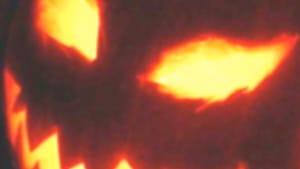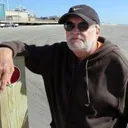Stay in the Loop
BSR publishes on a weekly schedule, with an email newsletter every Wednesday and Thursday morning. There’s no paywall, and subscribing is always free.
Scared silent on Mischief Night: A Halloween memoir, circa 1955
Mischief Night follies: A memoir

Until I was 13, we lived in a row house in suburban South Jersey. There were five short streets of these sturdy brick structures. Four of the streets were named after famous Americans like Thomas Edison and Calvin Coolidge. My street, though, was Dill Avenue"“ maybe named after the famous pickle?
Anyhow, Halloween was a big deal for us kids. Not the day itself, but the nights leading up to it: Soap Night, Chalk Night, Clothesline Night, and then Mischief Night. We'd dress in dark clothes and scurry through the alleys behind our houses, or make guerrilla forays out into the larger neighborhood of single homes, bent on our puerile, predictable pranks.
We were typical '50 suburban kids, respectful of the laws and mores of our times, and our Halloween hijinks were more a product of tradition than any kind of malicious intent. We'd heard tales, though, of kids peeing in milk bottles and then leaning them against doors and ringing the bell, or shitting in paper bags, lighting them, and throwing them on porches to await the gross results when homeowners would try to stamp them out.
But these were suburban myths to us, nothing we'd ever try ourselves. It was a long way in time and times from our Halloween activities to aberrations like Devil's Night in Detroit, when until recently the night before Halloween was a nightmare of unbridled arson and mayhem.
But even in our '50s suburbs, lines were occasionally crossed, both inadvertently and otherwise.
A shiny new Ford sedan, until….
One chilly Clothesline Night, as a half moon sailed silently from cloud to cloud, we were on Coolidge Avenue, headed for more alley creeping, when we spied, in front of the Andersons' house, a large packing crate that had held a new refrigerator. The Andersons' shiny new Ford sedan was parked in front of the house, and one of us came up with the idea of hoisting the crate onto the car roof. We had it almost on the roof when we saw the nails glinting from the bottom. We didn't stop. I can still hear the scrape of the nails on the pristine factory paint.
We took off like scalded dogs, and a half-hour later we were cutting clotheslines a few blocks away when we were surrounded by flashlight-wielding cops and hauled off to the police station.
They put the three of us on a bench against the wall and went on with their cop talk and business, seemingly forgetting about us. It was a time-tested torture ploy that worked on us like a witch's charm, and the endless minutes grew even longer while we awaited our judicial fate, our imaginations churning and our six eyes finally riveted to the dirty tile floor.
Our hearts cringed in unison
When the suspense was almost unbearable, the spell was broken by the entrance of Mr. Anderson to report his severely scratched new Ford sedan. A new paint job would be in order and the miscreants must be found and made to pay. We sneaked looks at each other, fear alive in our guilty eyes. This was now serious business.
"Do you have any idea who it was?" the desk sergeant asked Mr. Anderson.
It was then that Mr. Anderson seemed to notice us for the first time and looked at us thoughtfully. Our hearts cringed in unison.
"Not really. Neighborhood kids, I guess."
Oh, God, thank you, thank you.
The cops cut us loose shortly. They gave us five minutes to get home with the warning that they'd be calling our parents shortly.
We made it in three and, of course, there were no calls. But every time the phone rang for the next three days, we thought the jig was up. Those cops really knew their business.
Our mysterious neighbor
By the following year, our fear had faded to a slight tremor, and so we were out again. I had just cut the clothesline behind the Buchanans' house. Old man Buchanan had a pencil mustache and sold insurance, and his son Donald was rarely seen, silently boarding the bus to Drexel every morning and just as silently returning in the late afternoon. He wore plastic specs and was very muscular.
The Buchanans' clothesline in hand, I was making for the fence when a steely grip tightened around the back of my scrawny neck. My boys promptly scattered to the cold suburban winds (no honor among clothesline cutters).
"You like clotheslines, huh?" Donald Buchanan hissed in my ear. "OK, then. We'll see how you like clotheslines."
He led me by the neck grip around to the street and tied me securely to a thick tree by the very clothesline that was the matrix of my misery. He rummaged in my pockets until he found my penknife and brandished it threateningly in my face. Then he went inside the house.
Weighing my options
There I was, tied to a tree in my own neighborhood. I could barely believe it. I thought about yelling for help, but decided against it because the question would naturally arise how I'd gotten there and the last thing I wanted was another trip to the police station. My boys peeped around the corner a couple times, but I knew they lacked the raw courage to set me free. I was on my own.
Time again worked its dark magic. I was finally totally convinced that Donald Buchanan was going to emerge from the house and cut my throat with my own penknife.
After what seemed like hours, he appeared, brandishing the knife. I was scared silent. He cut my bonds and chucked the knife across the nearby railroad tracks into the weeds. He uttered not a word and went back inside. I scrammed.
The next year, on a quiet summer night, Donald Buchanan put a bullet through his head.
Happy Halloween.
Anyhow, Halloween was a big deal for us kids. Not the day itself, but the nights leading up to it: Soap Night, Chalk Night, Clothesline Night, and then Mischief Night. We'd dress in dark clothes and scurry through the alleys behind our houses, or make guerrilla forays out into the larger neighborhood of single homes, bent on our puerile, predictable pranks.
We were typical '50 suburban kids, respectful of the laws and mores of our times, and our Halloween hijinks were more a product of tradition than any kind of malicious intent. We'd heard tales, though, of kids peeing in milk bottles and then leaning them against doors and ringing the bell, or shitting in paper bags, lighting them, and throwing them on porches to await the gross results when homeowners would try to stamp them out.
But these were suburban myths to us, nothing we'd ever try ourselves. It was a long way in time and times from our Halloween activities to aberrations like Devil's Night in Detroit, when until recently the night before Halloween was a nightmare of unbridled arson and mayhem.
But even in our '50s suburbs, lines were occasionally crossed, both inadvertently and otherwise.
A shiny new Ford sedan, until….
One chilly Clothesline Night, as a half moon sailed silently from cloud to cloud, we were on Coolidge Avenue, headed for more alley creeping, when we spied, in front of the Andersons' house, a large packing crate that had held a new refrigerator. The Andersons' shiny new Ford sedan was parked in front of the house, and one of us came up with the idea of hoisting the crate onto the car roof. We had it almost on the roof when we saw the nails glinting from the bottom. We didn't stop. I can still hear the scrape of the nails on the pristine factory paint.
We took off like scalded dogs, and a half-hour later we were cutting clotheslines a few blocks away when we were surrounded by flashlight-wielding cops and hauled off to the police station.
They put the three of us on a bench against the wall and went on with their cop talk and business, seemingly forgetting about us. It was a time-tested torture ploy that worked on us like a witch's charm, and the endless minutes grew even longer while we awaited our judicial fate, our imaginations churning and our six eyes finally riveted to the dirty tile floor.
Our hearts cringed in unison
When the suspense was almost unbearable, the spell was broken by the entrance of Mr. Anderson to report his severely scratched new Ford sedan. A new paint job would be in order and the miscreants must be found and made to pay. We sneaked looks at each other, fear alive in our guilty eyes. This was now serious business.
"Do you have any idea who it was?" the desk sergeant asked Mr. Anderson.
It was then that Mr. Anderson seemed to notice us for the first time and looked at us thoughtfully. Our hearts cringed in unison.
"Not really. Neighborhood kids, I guess."
Oh, God, thank you, thank you.
The cops cut us loose shortly. They gave us five minutes to get home with the warning that they'd be calling our parents shortly.
We made it in three and, of course, there were no calls. But every time the phone rang for the next three days, we thought the jig was up. Those cops really knew their business.
Our mysterious neighbor
By the following year, our fear had faded to a slight tremor, and so we were out again. I had just cut the clothesline behind the Buchanans' house. Old man Buchanan had a pencil mustache and sold insurance, and his son Donald was rarely seen, silently boarding the bus to Drexel every morning and just as silently returning in the late afternoon. He wore plastic specs and was very muscular.
The Buchanans' clothesline in hand, I was making for the fence when a steely grip tightened around the back of my scrawny neck. My boys promptly scattered to the cold suburban winds (no honor among clothesline cutters).
"You like clotheslines, huh?" Donald Buchanan hissed in my ear. "OK, then. We'll see how you like clotheslines."
He led me by the neck grip around to the street and tied me securely to a thick tree by the very clothesline that was the matrix of my misery. He rummaged in my pockets until he found my penknife and brandished it threateningly in my face. Then he went inside the house.
Weighing my options
There I was, tied to a tree in my own neighborhood. I could barely believe it. I thought about yelling for help, but decided against it because the question would naturally arise how I'd gotten there and the last thing I wanted was another trip to the police station. My boys peeped around the corner a couple times, but I knew they lacked the raw courage to set me free. I was on my own.
Time again worked its dark magic. I was finally totally convinced that Donald Buchanan was going to emerge from the house and cut my throat with my own penknife.
After what seemed like hours, he appeared, brandishing the knife. I was scared silent. He cut my bonds and chucked the knife across the nearby railroad tracks into the weeds. He uttered not a word and went back inside. I scrammed.
The next year, on a quiet summer night, Donald Buchanan put a bullet through his head.
Happy Halloween.
Sign up for our newsletter
All of the week's new articles, all in one place. Sign up for the free weekly BSR newsletters, and don't miss a conversation.
 Bob Ingram
Bob Ingram